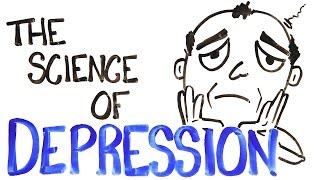With over 350 million people affected worldwide, depression is no doubt an incredibly real and serious issue. But, what exactly is going on inside of a depressed person? Is there a biological basis for these intense feelings of sadness? In the past, depression was often described as simply a “chemical imbalance” in the brain. Specifically scientist believed that a lack of the neurotransmitter serotonin was to blame, which is often referred to as the feel-good hormone. This was based on the finding that when some depressed individuals were prescribed medications which increased serotonin levels it helped alleviate their symptoms. Neurochemistry most certainly is involved. But this doesn’t really capture just how complex depression is. In recent years scientists began to notice that the brain cell growth and connections may also play a role. When we look at the brain of a depressed person, studies show that the hippocampus tends to be much smaller than average. Other areas are also physically affected but this region in particular controls memory and emotion. The longer a person has been depressed the smaller the hippocampus becomes. The cells and networks literally deteriorate. It turns out that stress may actually be a main trigger in the decrease of new neurons in this area of the brain. In fact, studies have shown that when this region of the brain is regenerated and new neurons are stimulated, mood improves. Interestingly, many modern medications, including those which affect serotonin levels, have an indirect effect on the growth of brain cells. This is likely why serotonin based treatments seem to help some patients but not for the reasons we once thought. In addition to enhancing serotonin levels, they promote the release of other chemicals which ultimately stimulate neurogenesis or the growth of new neurons.
Knowing this, some scientists now believe they should be looking at treatments which directly affect neurogenesis. But while your neurons and chemicals may be the direct influencers, many genetic factors have been discovered as well. One in particular is the variation in the serotonin transporter gene, which can leave individuals more vulnerable to depression. Every individual has two copies of the gene, one from each parent. This gene can either be short or long. After tracking 800 young adults over five years, the study revealed that 33% of individuals with one short version became depressed after stressful life events. And people are too short genes fared even worse. On the other hand, those with two long genes were much less likely to become depressed with similar life stress. Other genes have been identified which increase the likelihood of depression too and it makes sense when you consider that depression and bipolar disorder both run in families, studies of identical twins show that if one has bipolar disorder the other has a 60-80% chance of developing it too. The true cause or causes of depression have yet to be pinned down precisely. There’s a huge list of other variables that studies suggest may come into play. But, it’s important to remember that depression is a disease with biological basis along with psychological and social implications. It’s not simply a weakness that somebody should get over or even something that we have a say in. Just like heart disease or cancer, shedding light on the subject is of the utmost importance in order to bring funding and proper research.

